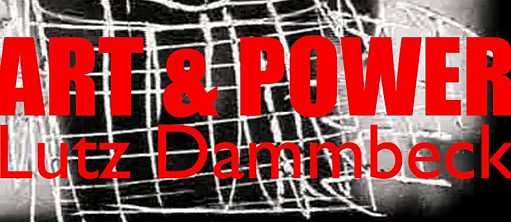Art & Power: Lutz Dammbeck
Following his September 2019 visit as artist-in-residence at the DEFA Film Library at the University of Massachusetts Amherst, German director and media artist Lutz Dammbeck will tour the USA with his film series Art & Power: Lutz Dammbeck featuring 18 of his documentaries and animation films. All films from the tour will be made available for rental and educational streaming by the DEFA Library.
The Washington DC leg of this tour will include three screenings of Dammbeck’s work, two of which will be followed by Q&As and discussions with the filmmaker himself. The film program, including Lutz Dammbeck’s appearances at the National Gallery of Art on September 15 and at the Goethe-Institut Washington on September 16, has been made possible with support from Wunderbar Together: Germany and the U.S., the DEFA-Stiftung, and the DEFA Film Library at the University of Massachusetts Amherst.
Now 70 years old, Lutz Dammbeck — who left the GDR in 1986 — is a thought-provoking and productive multimedia artist with decades of work to his name. His extensive repertoire includes documentary films that delve into contemporary issues, deeply personal documentaries related to his own experiences as an artist who defected from the GDR, experimental animated films, and experimental short films embedded with critical meaning.
Thursday, August 22, 2019, 6:30 pm @ Goethe-Institut Washington
The Animated Short Films of Lutz Dammbeck
After completing his military service, Lutz Dammbeck became a freelance painter and graphic artist in Leipzig, and produced his first DEFA animated film Der Mond – a short film for children – in 1975-76. He directed five more remarkable short animation films for DEFA as a freelancer. One of these was The Tailor of Ulm (Der Schneider von Ulm), an adaption of Bertolt Brecht’s poem about a tailor who rebels against officials, which he made at the invitation of legendary animator Kurt Weiler. Later in his career, Dammbeck directed one more animation film; produced for television in 1993, the children’s film Duke Ernest (Herzog Ernst), based on a medieval legend, tells the story of the first crusade and a brave knight who wins the heart of a princess.
Live! (Lebe!) (1978)
The Tailor of Ulm (Der Schneider von Ulm) (1980)
Einmart (1981)
Die Flut (The Flood) (1986)
Duke Ernest (Herzog Ernst) (1993)
Sunday, September 15, 2019, 4:00 pm @ National Gallery of Art, in the East Building Auditorium
The Net (Das Netz – Unabomber, LSD & Internet) / Das Netz – Unabomber, LSD und Internet (2004)
This film explores the history of the creation of the internet in relation to contemporary art and lifestyles. He contrasts this cluster of cultural phenomena to the paranoid and technophobic motives of the Unabomber, Ted Kaczynski.
Followed by a Q&A and discussion with Lutz Dammbeck.
Monday, September 16, 2019, 6:30 pm @ Goethe-Institut Washington
The Experimental Short Films & Short Documentaries of Lutz Dammbeck
Starting in the 1970s, Dammbeck worked on his own Super-8, 35mm, and video projects, including Metamorphoses I (Metamorphosen I) — one of the first experimental films to be shown publicly in the GDR—and Homage to La Sarraz (Hommage à La Sarraz), both of which make use of non-camera animation. These two films were the beginning of Dammbeck’s long-term art project the Hercules Concept (Herakles-Konzept), which the artist sees as a total artwork (Gesamtkunstwerk), including research materials, media collages, photographs, texts, painting, dance, film, and music. Dammbeck has continued to work on various sequences for and variations on his Hercules project ever since.
In the GDR, Lutz Dammbeck co-organized two groundbreaking exhibitions, designed to offer an alternative to state-organized art shows. In 1977, he helped developed the concept for an intermedia exhibition called Tangents I (Tangenten I), which was banned in 1978 and never took place. Metamorphoses I is an experimental film collage that was to be part of the exhibition. With five other young Leipzig artists, he then opened the First Leipzig Autumn Salon (1. Leipziger Herbstsalon) in the fall of 1984. The private exhibition met with the criticism and disapproval of officials. The short film fragment First Leipzig Autumn Salon shows original footage of the exhibition filmed by cinematographer Thomas Plenert, who collaborated with Dammbeck on other productions.
Metamorphoses I (Metamorphosen I) (1978-79)
Homage to La Sarraz (Hommage à La Sarraz) (1981)
1. Leipziger Herbstsalon (First Leipzig Autumn Salon) (1984-2008)
Dürers Erben (Dürer’s Heirs) (1996)
Followed by a Q&A and discussion with Lutz Dammbeck.
-
08/22
-
09/15
-
09/16
